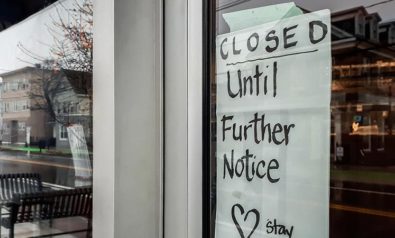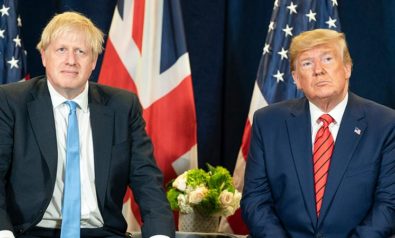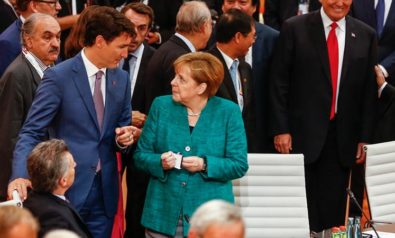Last week, I looked at some real economy and financial channels that the coronavirus pandemic has disrupted across the world. A global recession is now a foregone conclusion, and it will have emanated from the harsh impact on the economy.
On the one hand is the supply side, with production capacities cut back or stopped altogether as per the instructions of authorities. Volkswagen Slovakia, the largest Slovak employer, has suspended production in all three plants. Other large manufacturers are likely to follow suit. On the other hand is the demand side as consumers have been told to stay at home and have limited access to goods and services.
COVID-19 Outbreak Takes the Recession Debate to Brand New Territory
Both of these factors are putting pressure on domestic economies and international trade. Added to that, transnational supply chains are severely disrupted and tumbling stock markets are wiping away wealth. The uncertainty about the extent, severity and future trajectory of the coronavirus — which causes COVID-19 — further impairs the confidence channel.
These effects have struck the real economy at superspeed and affected our daily lives. People are stockpiling to reduce the frequency of grocery shopping trips as well as panic buying in the expectation of shortages. Food chains offering home delivery services are overwhelmed by the number of orders. Many companies are forced to cancel online orders due to high demand, citing “technical issues.” Despite calls for social distancing by governments, hardware stores are facing perpetual lines, and their half-empty shelves trigger painful memories of the golden era of socialism.
Meanwhile, in Slovakia, some individuals have not grasped the sense of urgency in managing the outbreak. Troubling social media posts have surfaced of citizens seeing this emergency as an opportunity to let off some steam skiing.
The Economy
The economics of the COVID-19 outbreak is an interesting one. The behavior of individuals has a significant impact on the public health and economic outcomes of an entire country. The behavior exemplified by some in Slovakia will inevitably lead to a scenario like Italy, which is currently the European epicenter of the coronavirus pandemic. On the other hand, the combination of prudent, top-down decision-making, coupled with bottom-up responsibility, could lead to a more managed outcome — both socially and economically.
As the pandemic sheds light on the classic dichotomy between individualism and collective interest, it begs the question of what globalization and supranational cooperation can do for us these days. With the world at unease, central banks continue running the course of synchronized monetary easing. On March 15, the US Federal Reserve delivered another emergency interest rate cut that is now nearly zero. This was accompanied by the launch of a massive $700 billion quantitative easing program. The European Central Bank announced its own set of measures on March 12, including immediate liquidity support and its own asset-purchase program. Moreover, world leaders have pledged to take concerted fiscal action.
The economic response is critical. The objectives include helping the economy to continue functioning, preventing the hardest-hit sectors and businesses from going bust, and ensuring that public health care is sufficiently funded. National policy measures are a vital part of a comprehensive response strategy, as each economy has been affected differently by the coronavirus pandemic and they each have different resources at hand.
An intense global downturn will, additionally, demand heavy lifting on the part of international institutions. This response must be comprehensive, multi-disciplinary and fast-moving. This is not a time for interstate bickering. Multilateralism may be in a dire state, but it is now the time to stick to the basics and synchronize across policy domains that are mutually agreeable.
Bringing Change
The COVID-19-induced crisis will lead to a broader paradigm shift in policymaking. One-sided policymaking will no longer suffice. A balanced and diversified approach across toolkits (monetary-fiscal-structural), actors (national, international) and time (short-term versus long-term impacts) is the global economy’s best bet in addressing the fallout that will ensue. Policy dominated by a strategic foresight and a targeted, potential-enhancing and resilience-strengthening approach is long overdue.
The health of the economy is also bolstered from the bottom up, and the COVID-19 outbreak has highlighted systemic weak points across business and supply chains. It is Schumpeterian creative destruction at its best. Supply shortages across “winning sectors,” such as food and medical supplies, indicate poor inventory management and analytics. Long lines outside stores and canceled online orders suggest a lack of digital presence and associated infrastructure.
The disruption of supply chains means different things to different sectors. Some industries should rethink their excessive reliance on one country or region, such as China, while others should consider diversifying their sources. The current situation with supply chains highlights the need for business contingency plans geared toward being operational with minimal workers physically present. In any case, harnessing existing technologies, coupled with the constant reframing of business efforts seem to be the suitable foundation for a makeover in business.
It is only March and we are at an inflection point in 2020. The extent of change in our daily routines and the tyranny of uncertainty we are not accustomed to will be carved in our collective memory for many years to come. But as the saying goes, never let a good crisis go to waste. The global health crisis may be the catalyst for much-needed change across policymaking domains and business. This is a change that, in normal times, would slowly unfold for perhaps an entire decade.
*[GLOBSEC is a partner institution of Fair Observer.]
The views expressed in this article are the author’s own and do not necessarily reflect Fair Observer’s editorial policy.
Support Fair Observer
We rely on your support for our independence, diversity and quality.
For more than 10 years, Fair Observer has been free, fair and independent. No billionaire owns us, no advertisers control us. We are a reader-supported nonprofit. Unlike many other publications, we keep our content free for readers regardless of where they live or whether they can afford to pay. We have no paywalls and no ads.
In the post-truth era of fake news, echo chambers and filter bubbles, we publish a plurality of perspectives from around the world. Anyone can publish with us, but everyone goes through a rigorous editorial process. So, you get fact-checked, well-reasoned content instead of noise.
We publish 2,500+ voices from 90+ countries. We also conduct education and training programs
on subjects ranging from digital media and journalism to writing and critical thinking. This
doesn’t come cheap. Servers, editors, trainers and web developers cost
money.
Please consider supporting us on a regular basis as a recurring donor or a
sustaining member.
Will you support FO’s journalism?
We rely on your support for our independence, diversity and quality.
































